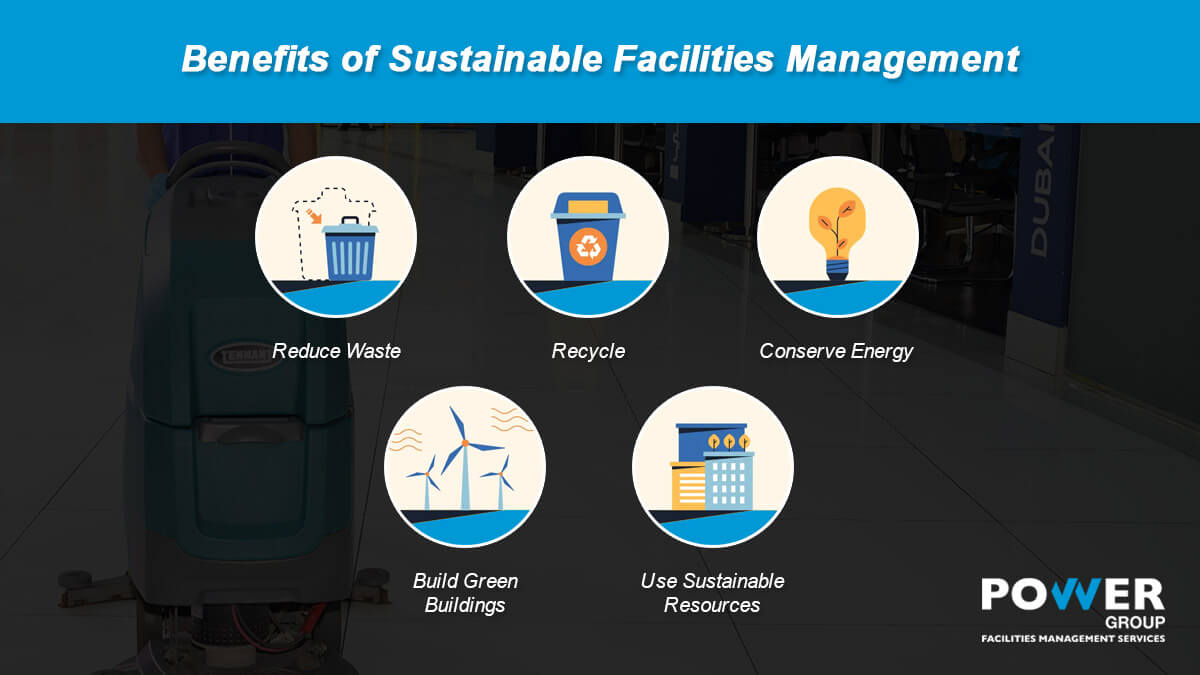Facilities management is a critical aspect of any organization’s operations, encompassing various activities such as maintenance, repairs, cleaning, and security. However, as the world grapples with the effects of climate change and dwindling natural resources, there is a growing need for facilities management practices to be sustainable and environmentally responsible. Sustainable facilities management solutions involve implementing strategies that reduce negative environmental impacts while improving economic and social outcomes. In this blog, we will explore the key benefits of sustainable facilities management. Let’s start!
Why Every Business Needs to Invest in Sustainable Facility Management
Investing in sustainable facility management is essential for businesses seeking long-term growth and success. SFM provides a comfortable and healthy work environment for employees, leading to increased productivity and reduced absenteeism but also attracts high-quality talent seeking to work for companies with a sustainable reputation. This, in turn, helps organizations retain employees, reducing the need for costly recruitment and onboarding.
Moreover, sustainable facilities management can help businesses manage ever-increasing energy costs. Green buildings are significantly less expensive to operate and maintain, with smart technology and monitoring tools reducing the need for excessive maintenance. While the initial investment in constructing green premises may be higher, the long-term energy efficiency benefits are indisputable and create an advantage in a highly competitive market. In addition, sustainable facility management practices are also becoming a requirement when bidding for contracts and securing investments. Companies prioritizing sustainability and environmental responsibility are seen as more trustworthy and reliable partners, giving them a competitive edge in the marketplace. Trusting a facility management company can be a great option to attain facility management objectives. Below is a detailed discussion of the benefits of sustainable facilities management.
Here are the Top 5 Benefits of SFM:
Reduced Carbon Footprint:
The mitigation of carbon footprint through sustainable facilities management is a paramount objective. A proficient and sustainable facility management policy diligently scrutinizes energy inefficiencies and implements appropriate strategies to curtail energy consumption. These strategies encompass conducting energy audits, integrating solar panel technology, utilizing LED lights or compact fluorescent bulbs, refurbishing structures, embracing eco-friendly building practices, and running equipment exclusively when necessary. By diminishing energy consumption, facility managers can alleviate carbon emissions and uphold ecological conservation.
Carbon Footprint
Sustainable practices can help businesses reduce their energy and water consumption, ultimately lowering utility bills. Moreover, sustainable facilities require less maintenance, resulting in reduced maintenance costs, which can be substantial. For instance, by replacing traditional fluorescent bulbs with LED lighting, companies can reduce their energy consumption by up to 75%, leading to significant cost savings. Additionally, green buildings that utilize renewable energy sources are more affordable than traditional ones, enabling facility managers to recoup their upfront costs quickly. Furthermore, green buildings have a higher value than traditional ones, making them an excellent investment opportunity. Implementing innovative technology, such as occupancy sensors, motion sensors, and ventilation systems, can also lead to significant savings on electricity bills.
Waste Reduction
Implementing eco-friendly and sustainable facility management practices can significantly reduce waste and water usage. Facility managers have various strategies, such as using vermicompost pits, rainwater harvesting pits, and sensor-based low-flow aerators, that can help them minimize waste output. Additionally, raising awareness of waste management through education programs can effectively promote responsible waste management practices among employees, clients, and residents. Ultimately, such practices can contribute significantly to maintaining a clean and healthy environment.
Conducive Work Environment:
Incorporating sustainable practices in building management ensures that high standards of air quality, security, and water are maintained. This, in turn, fosters the creation of a comfortable and conducive working environment for employees, which results in increased productivity and overall benefits for the business. Today’s employees seek opportunities to work for companies that are committed to corporate social responsibility and sustainable practices. Thus, organizations prioritizing sustainability are better positioned to attract top talent and retain their existing staff. In addition to enhancing employee satisfaction, sustainability practices can also increase the productivity of both employees and assets, reduce absenteeism, and make the company more attractive to potential hires. Creating a sustainable work environment by hiring facility management services offers numerous benefits that can ultimately lead to a more prosperous and thriving business.
Brand Reputation
Achieving sustainable facilities management reflects a moral obligation and demonstrates a sound business strategy by reducing an organization’s environmental footprint. Organizations can consistently commit to environmentally responsible practices to enhance their brand reputation among clients, customers, and employees. By showcasing an organization’s care for the planet, sustainable facilities management ensures that the environmental impact of operations is minimized, neutralized, or even positively contributed to.
Wrapping Up
Sustainable facilities management is not just a buzzword or trend but a vital practice for any organization looking to create a better future. By prioritizing sustainability in facility management, organizations can reduce costs and comply with regulations and create a healthier and more productive environment for their employees and stakeholders. It is a step towards building a more sustainable world that can drive innovation and provide new opportunities for growth and competitiveness. Ultimately, sustainable facilities management is good for business and the planet, and the people who inhabit it. So hire a facility management company like ours to help you achieve your sustainability goals!

